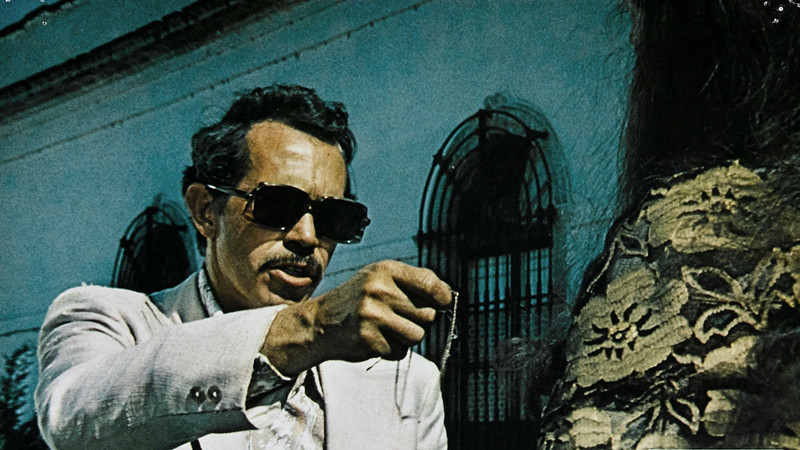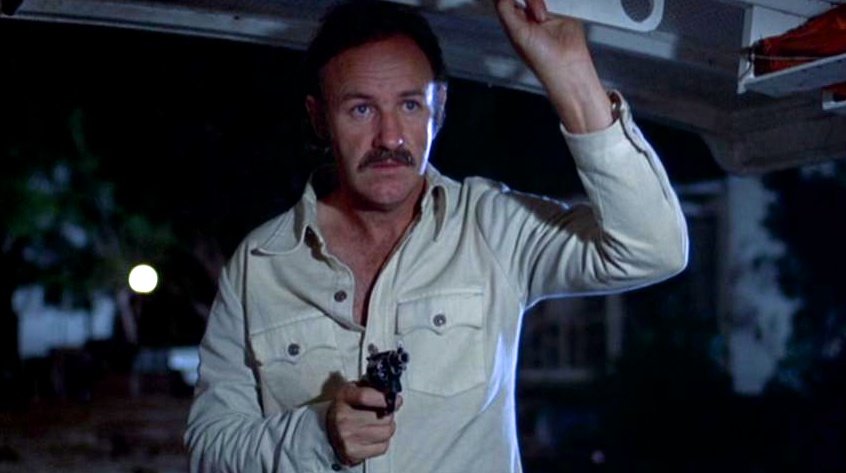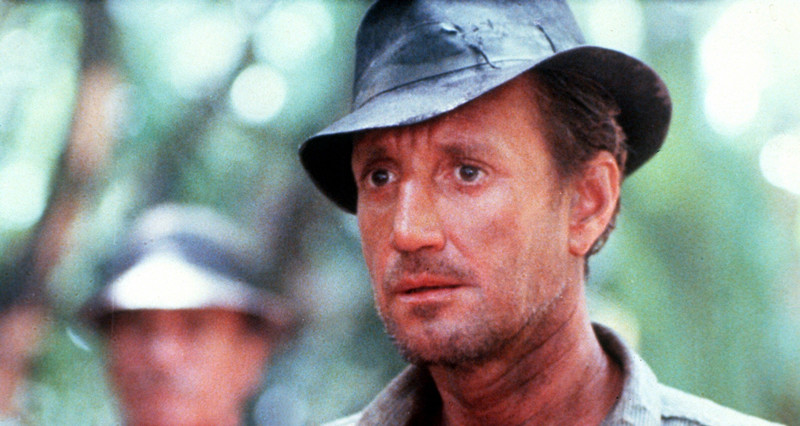6. Bring Me the Head of Alfredo Garcia (1974)

Sam Peckinpah’s filmography is impressive to say the least. Not necessarily because it’s wall to wall masterpieces (it’s not) but because of the influence and controversy that sticks to some of them still to this day.
Straw Dogs (1971) remains one of the most contentious films ever made, and The Wild Bunch is still arguably the most violent western ever put to screen. Whether you agree with these sentiments or not, it’s undeniable that Peckinpah nearly always brings something interesting to proceedings. Bring Me the Head of Alfredo Garcia is a nihilistic, dust-covered road movie that turns a straightforward bounty hunt into something far more unhinged. The film is drenched in sweat and tequila, and any happiness that is suggested at swiftly evaporates.
Warren Oats stars as Bennie, a washed-up piano player who scratches a living in a seedy Mexican bar, until he hears about a bounty placed on the head of Alfredo Garcia, and sets off with his girlfriend Elita (Isela Vega) in an attempt to find Garcia, on what quickly descends into a brutal and bloody trip filled with regret, desperation and violence. Oats is brilliant, channelling Peckinpah’s own sadly self-destructive tendencies (rumour has it that Peckinpah was in a period of alcoholic fear and trembling during production) as he drinks, stumbles and shoots his way through a filthy nightmare of a trip. The film feels lived-in and grotty for its duration, adding to the feeling of authenticity that Peckinpah brings to the film, leaning heavily into the dank and grimy ugliness of the story while the characters in it remain bitter and uncompromising.
Dismissed on release, Bring Me the Head of Alfredo Garcia deserves reassessment; it may well be Peckinpah’s most personal film, completely misunderstood on release as Peckinpah drank himself into an early grave.
7. Night Moves (1975)

One of Gene Hackman’s finest ever films, Night Moves is sorely underseen and wildly underrated. Here, he plays moody private investigator Harry Moseby, hired by an ageing narcissistic actress to find her young daughter who has run away from home.
She is clearly a troubled lady but a narcissist nonetheless; far more interested in her own sex life (whilst being incredibly blasé about her sixteen-year-old daughter’s) than her daughter’s upbringing. Her only source of income is her daughter’s trust fund, and she spends that to hire Harry, knowing that the trust fund is reliant on her living with her daughter. Harry is also dealing with his wife’s infidelities, which is also part of the reason he takes the case; he simply doesn’t have the time to deal with their marital issues front on if he’s chasing a runaway across state lines.
The reasons that Night Moves is such an excellent film are manifold, the lead one being Hackman himself, channelling his inner “Popeye Doyle” from The French Connection (1975) to create a completely different character but one that is equally interesting to spend time with. Hundreds of films deal with characters who have their own personal demons but Night Moves combines both personal and career problems to make for a genuinely interesting set of characters; Harry’s wife isn’t just a throwaway female who’s cheating on him, she’s a fully rounded character whose issues come to the fore and eventually have to be addressed; meaning that when Harry is investigating the disappearance we feel the baggage he’s sitting on and don’t just forget about it.
It also helps that Night Moves has plenty of twists and turns and has you intrigued from the start, meaning you’re trying to join the dots yourself as Harry investigates, and the film’s screenplay adds to the excitement, leaving you with no clue how it’s all going to end.
8. The Man From Hong Kong (1975)

A truly mad romp, a film posing as an A-lister with a cast including former James Bond George Lazenby, this is an Ozploitation thriller that could almost be straight from the Grindhouse scene. Jimmy Wang Yu’s Hong Kong special branch agent is brought in by the Sydney police department to interrogate a drug mule, hoping the information garnered will lead to the man behind the trafficking itself, who may or may not be George Lazenby.
It’s hard not to think of the previous year’s Roger Moore fronted Bond film, The Man with the Golden Gun, and although on a technical level the Bond film is unsurprisingly superior, it’s hard to argue that this isn’t a whole heap more fun. It’s ridiculous almost beyond belief, but the choreography in the fight scenes is impressive; it’s insanely violent, and there are also clear influences on some of Tarantino’s work, especially the ‘Crazy 88’ fight in Kill Bill: Volume 1 (2003).
Directed by Brian Trenchard-Smith, The Man from Hong Kong is a wild mix of kung-fu action, seventies cop movie grit, and true chaos, enabling Lazenby to dial up the sleaze as crime boss Jack Wilton, relishing every moment as a man who’s as smooth as he is ruthless. It’s pure unfiltered seventies action, loud, fast, and gloriously over the top, a terrific B-movie that has enough in it to justify its posing as an A-lister, and it will have a smile on your face for all the right and wrong reasons.
9. Sorcerer (1977)

William Friedkin’s remake of Henri-Georges Clouzot’s The Wages of Fear (1953) was released just a month after Star Wars. Combine that with the fact that the budget of Friedkin’s film eventually rocketed to $22 million, it’s not hard to understand how and why the film died a death on its release in 1977. The shame of it, is that Sorcerer is a masterpiece.
The film follows four criminals; Roy Scheider’s American gangster, a hitman from France, a corrupt banker from Mexico, and a Palestinian terrorist who all end up stranded (for various reasons) in a godforsaken and lawless South American village, where no-one talks about their past, and there’s nothing to do but drink and contemplate your existence.
When a local oil company offers them a suicide mission, transporting highly unstable nitroglycerin across treacherous mountain terrain, with a big pay day for successful completion, the four men jump at the opportunity. What follows is a relentless exercise in tension, stripping everything down to pure survival; you can feel the exhaustion and hopelessness of the characters as well as being able to almost inhale the jungle as they precariously traverse the elements.
The infamous rope bridge scene is one of the most nerve-wracking sequences ever put to screen and somehow reminds you of Werner Herzog’s Fitzcarraldo (1982) in a sadistic way, a film that was still five years away. It’s a relief to see that Sorcerer has had some sort of critical resurrection in recent years, but that doesn’t make up for the fact that it flopped on release. What it does do however, is enable many people who are yet to witness this astonishing piece of work a new lens to view it through.
10. Rolling Thunder (1977)

John Flynn’s Rolling Thunder (written by Paul Schrader) is one of the great revenge thrillers of the seventies, dark and brutal sure, but also strangely melancholic. William Devane is on career best from as Major Charles Rane, a Vietnam POW who returns home to a hero’s welcome but feels very out of place. He’s distant, haunted, barely present and struggling to make a connection with reality.
Things take an even bleaker turn when a gang of low-level thieves break into his house, murder his family and leave him for dead. What follows is a film that leans into the sub-genre of post-Vietnam disillusionment; something captured brilliantly for example in First Blood (1982) or latterly Dead Presidents (1995). But Rolling Thunder feels even more raw, released only two years after the end of the war and a year after Martin Scorsese’s Taxi Driver (1976), a film that Paul Schrader also penned).
Devane exudes a coldness that effectively assures us that he’s lost interest in life or indeed the consequences of his subsequent actions, and he’s not alone in his rampage of revenge; Tommy Lee Jones’s fellow disturbed vet is along for the ride, exuding a similar air of abandonment at his situation and fully understanding of Rane’s actions.
Rolling Thunder heavily influenced Bruce Springsteen’s 1978 album Darkness on the Edge of Town and was also cited by Quentin Tarantino as one of his favourite ten films of all time in a Sight & Sound poll; and it’s easy to see the impact of Flynn’s film on Tarantino’s work. The violence when it arrives, is vicious and unflinching, no glorification, just pure mean-spirited brutality, and a desolate reminder of Vietnam war reverberations.